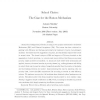Free Online Productivity Tools
i2Speak
i2Symbol
i2OCR
iTex2Img
iWeb2Print
iWeb2Shot
i2Type
iPdf2Split
iPdf2Merge
i2Bopomofo
i2Arabic
i2Style
i2Image
i2PDF
iLatex2Rtf
Sci2ools
AMMA
2009
Springer
2009
Springer
School Choice: The Case for the Boston Mechanism
I study school assignment problems, focusing on two popular mechanisms: the Boston Mechanism (BM) and Deferred Acceptance (DA). The former has been criticized regarding both e¢ ciency and fairness, particularly its treatment of naïve (non-strategic) students. The latter has been suggested in its place, and has already replaced the former in several cities. The formal critique of BM and support of DA were founded on the assumption of strict priorities, i.e., schools rank every child so that there are as many priority classes as there are students. In almost all cities where these mechanisms are applied, however, the actual number of priority classes (e.g., walking-distance and sibling in school) that may be used is orders of magnitude smaller than the number of students, and tie-breaking lotteries are needed. Approximating this case by assuming only one priority class, I show that BM outperforms DA according to several ex ante e¢ ciency criteria. DA performs very poorly if all stude...
| Added | 25 May 2010 |
| Updated | 25 May 2010 |
| Type | Conference |
| Year | 2009 |
| Where | AMMA |
| Authors | Antonio Miralles |
Comments (0)

